
Football is the most popular sport in Spain, with 61% of the population interested in it. Spain has some of the most influential teams in Europe as well as many players and teams registered in all categories. Moreover, football is the sport that interests the majority of Spanish people (48%) and a total of 67% of the population said they were fans of or had a liking for a particular club.
Cristóbal Emilio "Curro" Torres Ruiz is a Spanish retired footballer who played as a right-back, currently manager of Estonian club FCI Levadia Tallinn.
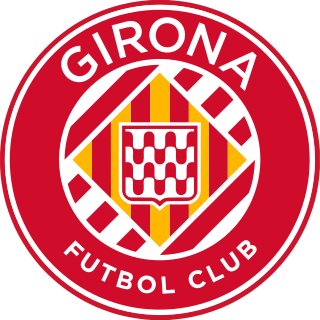
Girona Futbol Club, S.A.D. is a Spanish professional football club based in Girona, Catalonia. Founded on 23 July 1930, the team plays in La Liga, to which they gained promotion in the 2022 Segunda División play-offs.
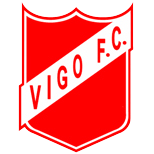
Real Vigo Sporting Club, was a Spanish football club based in Vigo, Galicia, founded in 1905.

Real Fortuna Football Club, was a Spanish football club based in Vigo, Galicia, founded in 1905.
The Copa del Rey 1916 was the 16th staging of the Copa del Rey, the Spanish football cup competition.
The King Alfonso XIII's Cup 1922 was the 22nd staging of the Copa del Rey, the Spanish football cup competition.
The 1927 Copa del Rey Final was the 27th final of the Spanish cup competition, the Copa del Rey. The final was played at Torrero, in Zaragoza, on 15 May 1927. Real Unión beat Arenas Club de Getxo 1–0 and won their third and last title. The only goal of the match was scored in extra-time by José Echeveste.

Jonathan Castro Otto, commonly known as Jonny, is a Spanish professional footballer who plays as a right or left-back for Super League Greece club PAOK.
Bernabe Costas de Miranda is a professional wheelchair basketball player from Spain. As a member of Spain men's national wheelchair basketball team, he earned a bronze at the 2011 European Championships, and a fifth-place finish at the 2012 Summer Paralympics. He has spent most of his professional career playing for Aldasa Amfiv de Vigo in Spain's top level domestic wheelchair basketball league.

The Spain national football team has played in several matches dating back to 1913, which according to various sources are not counted as 'Tier A' international matches. In 2020, the sports newspaper Marca reported that there were 74 such matches, most of them either played during the Spanish Civil War era, charity fundraisers or pre-tournament warm-up matches against clubs or regional representative teams; of the 403 players involved in those matches, 89 were never capped in an official match.
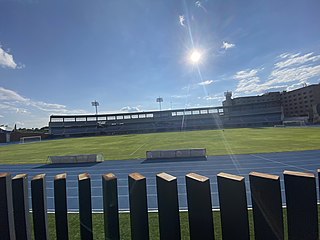
The Estadio Olímpico de Querétaro, also called Estadio Olímpico Alameda, is a multi-use stadium in Querétaro City, Querétaro, Mexico. It is currently used mostly for football, american football matches and athletics, and is the home stadium for Querétaro women's team, Inter de Querétaro F.C. and Gallos Negros. The stadium has a capacity of 4,600 people, was opened in 1939 and renovated in 2021.

Joaquín Yarza Ormazábal, also known as Quincho Yarza, was a Spanish footballer who played as a midfielder for Madrid FC. Along with his brother Manuel, he was a member of the Madrid FC side that won the Copa del Rey four times in a row, between 1905 and 1908, although Joaquín only participated in the first three, leaving the club in 1907 to join Sporting de Vigo. Quincho helped Sporting reach their first-ever final in 1908, in which the Yarza brothers were rivals, as Manuel stayed at Madrid. Quincho was a versatile footballer, playing in defense, midfield and attack.
The first official football match in Spain between two sides playing under the rules of the English FA took place in Seville on 8 March 1890 at the Hipódromo de Tablada. It was contested between the two oldest clubs in Spain, Recreativo de Huelva and Sevilla FC.
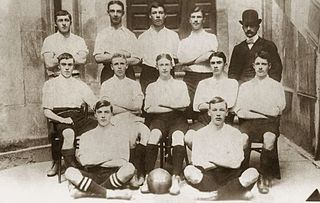
The Exiles Cable Club was a multi-sports club based in Galicia, Vigo. It was founded in 1873 by English workers of the Eastern Telegraph Company. It was one of the first companies dedicated to sports in the country, most notably, football, having a section dedicated to the said sport due to its rapid growth in England, the homeland of the company's workers. Recent studies have shown that the Exiles football team, known as Exiles Foot-Ball Club or Exiles FC, was the first football club to have been recorded in the Iberian Peninsula, being one of the proto-clubs that pioneered and expanded football in Spain, together with the Rio Tinto English Club (1878) and the Cricket and Football Club of Madrid (1879).
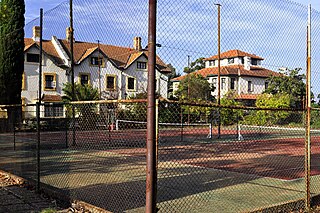
The Club Inglés Bella Vista is a cultural institution that exists in the Spanish municipality of Minas de Ríotinto, in the province of Huelva. It was founded in 1878 by members of the British colony of Minas de Riotinto who worked for the Rio Tinto Company Limited (RTCL), and it soon become the center of social life in that British colony. Together with Exiles Cable Club (1873) in Vigo, this was one of the first companies dedicated to sports in the country, most notably, cricket, tennis and football, having sections dedicated to the said sports due to its prominence in England, the homeland of the company's workers.
Alfred Edward Elvin Mills was an English footballer who played as a defender for Spanish club Athletic Club. He is best known for being the only foreigner among the 33 founders of the club, the ‘Inglés en Bilbao’. Mills was one of the most important footballers in the amateur beginnings of Athletic, co-founding the club and then serving as a board member and a captain, winning the 1904 Copa del Rey.

Manuel de Castro González, better known as Hándicap, was a Spanish sports journalist, football executive, manager, referee, and politician. He was one of the most important figures in the amateur beginnings of football in Vigo, being noted for his prominent role in promoting football in the city and as the fundamental head behind the foundation of Celta de Vigo in 1923.

Jonatan Giráldez Costas is a Spanish football coach who is the current head coach of National Women's Soccer League team Washington Spirit.
José María Abalo Abad, was a Spanish footballer who played as a forward for Sporting de Vigo and later worked as a referee. He was one of the most important figures in the amateur beginnings of football in Galicia, being noted for his prominent role in promoting football in the city and for founding the first football clubs in the region, such as Football Corunna Club.











